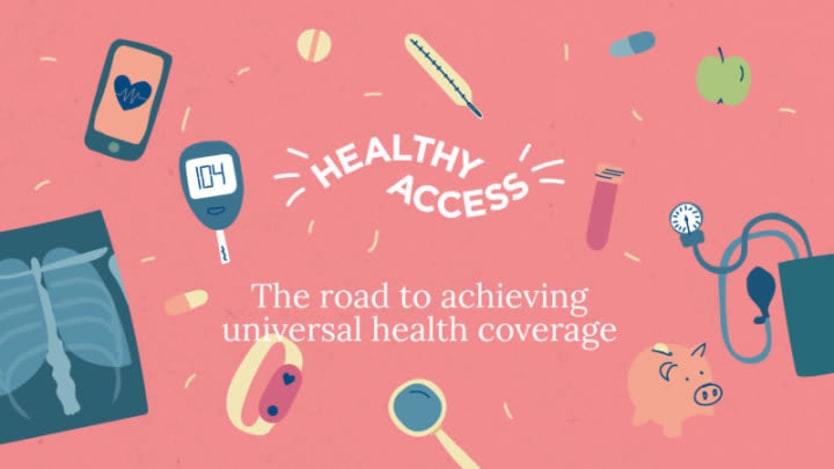
NAIROBI — Singers, dancers, and acrobats descended on a stage in Nairobi each Sunday night since August for the “East Africa’s Got Talent” competition — the region’s inaugural version of “America's Got Talent” — which wrapped up last weekend.
While viewers at home were entertained by performers from the region, the Kenyan government also hoped to capitalize on the show’s millions of viewers by taking the opportunity to promote tips on healthy living.
“The private sector has perfected the use of celebrities to change consumer behavior ... The global health community is just catching up.”
— Thea Klement, communications manager, Access ChallengeThe show brought together performers of all ages from Kenya, Tanzania, Rwanda, and Uganda to compete for $50,000. A brother and sister singing duo from Uganda took home the prize on Sunday.
Working with Access Challenge, a U.S.-based nonprofit advocacy organization, and production company Clouds Media Group, the Kenyan government used the show as a platform to spread messaging on preventing and controlling noncommunicable diseases — a category of conditions that are not directly transmissible from one person to another and that account for more than half of deaths in Kenya.
During commercial breaks and on social media, the show’s celebrity judges and host — Kenyan journalist Jeff Koinange, Ugandan actor Gaetano Kagwa, Rwandan-Jamaican DJ Makeda Mahadeo, Tanzanian singer Vanessa Mdee, and Ugandan comedian Anne Kansiime — discussed NCDs including mental health, cancer, diabetes, and obesity, as well as risky behaviors such as alcohol and tobacco consumption, poor exercise and unhealthy diets. The slogan “A healthy nation is a talented nation” followed each of the ads.
However, there is still limited research on how effective such campaigns can be.
Africa is expected to see a 27% increase in mortality from NCDs over the next 10 years, amounting to 28 million deaths.
“Noncommunicable diseases were chosen because the Minister of Health of Kenya said there's a rising incidence of NCDs across East Africa. They asked us to use this platform in order to give fundamental messages on those,” explained Kate Campana, CEO of Access Challenge.
She added that: “Each of these celebrity judges chose the topic that he or she found most compelling because of personal experience. Their [public service announcements] therefore resonate profoundly.” Aside from the prepared commercials, the judges also engaged with the audience more informally during the live shows.
For example, Mdee declared “It’s OK not to be OK” during a commercial about mental health. Speaking about cancer, Koinange advised to “junk the junk food, the drink, the smoking.”
Access Challenge said they expected the show to reach 120 million people across the four countries taking part.
The project is part of the “popular engagement” strand of the Kenyan government’s work on universal health coverage, Campana explained. Although it is the first time that Kenya’s Ministry of Health has used celebrities to promote health messaging, Access Challenge has prior experience. For example, it previously worked with actor Idris Elba, and soccer players Yaya Touré and Kei Kamara, to push Ebola prevention messages during the West Africa outbreak.
“The private sector has perfected the use of celebrities to change consumer behavior and has a long history of using celebrities in marketing. The global health community is just catching up,” commented Thea Klement, communications manager at Access Challenge.
The Kenyan Ministry of Health now aims to integrate the tactic into its national rollout of universal health coverage, said Josephine Mbeo, the ministry’s head of public communications.
The ability of celebrities to bring about behavior change by promoting health messaging is still unproven, according to a 2017 review of research published in the Systematic Reviews journal.
Some efforts have claimed promising results. A mass media campaign to promote bed net usage in Cameroon, which included about 100 billboards featuring local celebrities, suggested there had been a "significant impact" from "using credible and popular local celebrities as messengers, distributing consistent messages across multiple mass media outlets, and reinforcing messages over time." Over 60% of respondents recalled at least one of these activities.
Beyond the use of celebrities, other uses of popular culture have also been tested. For example, studies of “MTV Shuga,” an African television drama series, found that audience exposure in Nigeria led to "improved viewers’ knowledge and attitudes, increased HIV testing, reduced risky sex, and among women, led to fewer sexually transmitted infections."
“East Africa’s Got Talent” show is only one part of Access Challenge’s larger advocacy campaign in support of the World Health Organization’s universal health coverage targets. Through campaigns with soccer stars, religious leaders, and social media influencers across the African continent, Access Challenge hopes it can create “a popular base in support of UHC health initiatives in each country,” Klement said.
For a closer look at the innovative solutions designed to push for progress on universal health coverage around the globe, visit the Healthy Access series.

